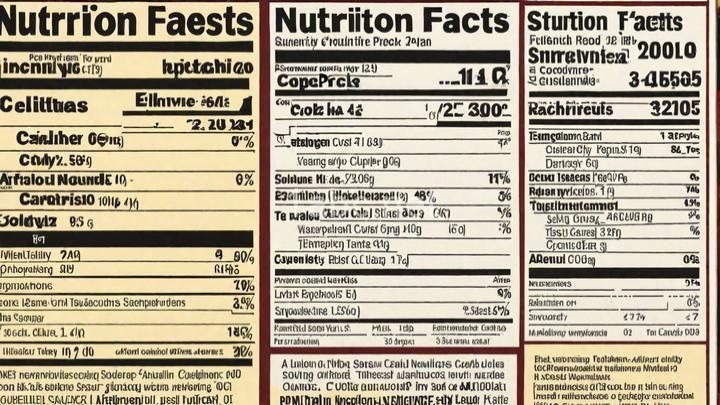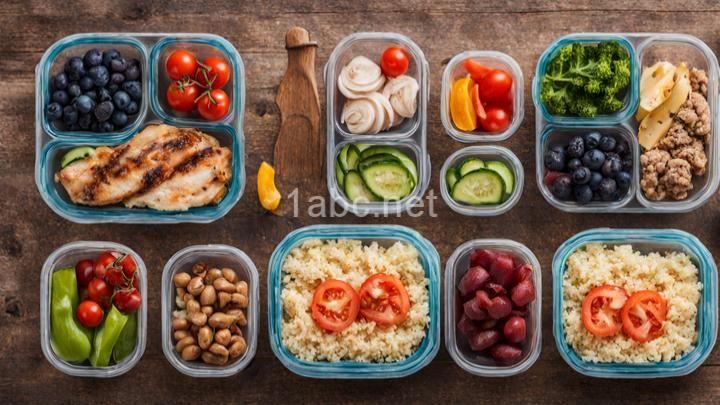Fuel Your Body Right: A Guide to Optimal Nutrient Timing for Peak Performance

Introduction:
Welcome to the ultimate guide on how to fuel your body right for optimal performance and recovery. Whether you're an athlete, fitness enthusiast, or someone looking to improve their overall health and well-being, understanding the importance of nutrient timing is crucial. By strategically timing your meals and snacks, you can maximize your energy levels, enhance your workout performance, and support muscle recovery.
Section 1: Understanding Nutrient Timing
To start off, let's dive into what nutrient timing is all about. Nutrient timing refers to the strategic planning of meals and snacks to optimize athletic performance and recovery. It involves consuming specific macronutrients, such as carbohydrates, proteins, and fats, at strategic times to fuel your body efficiently.
Carbohydrates are the body's primary source of energy and play a vital role in fueling your workouts. They are broken down into glucose, which provides immediate energy for your muscles. Proteins are essential for muscle repair and growth, as they provide the building blocks (amino acids) necessary for these processes. Fats, on the other hand, are a concentrated source of energy and play a crucial role in hormone production and nutrient absorption.
To ensure optimal nutrient timing, it's vital to consume balanced meals and snacks throughout the day. This means including a combination of carbohydrates, proteins, and fats in each meal to support energy levels, muscle repair, and overall health.
Section 2: Pre-Workout Nutrition
Now let's talk about the importance of pre-workout nutrition. Fueling your body properly before a workout is essential to provide the energy needed to perform at your best. A well-balanced pre-workout meal or snack can help increase endurance, improve focus, and prevent muscle breakdown.
When it comes to pre-workout options, you want to focus on foods that are easily digestible and provide a steady release of energy. Some suitable choices include a banana with peanut butter, a protein smoothie with fruits and vegetables, or a small bowl of oatmeal with a scoop of protein powder.
Section 3: During Workout Nutrition
During your workout, it's crucial to fuel your body to sustain energy levels and prevent fatigue. Depending on the duration and intensity of your exercise, you may need to consume additional fuel to keep going strong.
Sports drinks and energy gels are popular options for during workout nutrition, as they provide a quick source of carbohydrates and electrolytes. These can help replenish glycogen stores and maintain hydration levels during prolonged or intense exercise sessions. However, it's important to note that the need for during workout nutrition varies depending on individual factors and the nature of the workout.
Section 4: Post-Workout Nutrition
After an intense workout, your body needs proper nutrition to recover and repair. Post-workout nutrition is crucial for replenishing glycogen stores, reducing muscle soreness, and promoting muscle growth.
Aim to consume a combination of carbohydrates and proteins within 30 minutes to an hour after your workout. This can be in the form of a well-balanced meal or a convenient post-workout snack. Some examples include a chicken breast with sweet potatoes and vegetables, a protein shake with fruits and spinach, or a bowl of Greek yogurt with granola and berries.
Section 5: Bedtime Snacking
While you sleep, your body undergoes important processes of recovery and muscle repair. Consuming a balanced snack before bed can provide your body with the necessary nutrients to support these processes and prevent muscle breakdown.
Greek yogurt with nuts, a small serving of cottage cheese with berries, or a protein bar are all excellent options for bedtime snacking. These snacks provide a combination of protein and healthy fats, which can help sustain muscle protein synthesis throughout the night.
Conclusion:
By following the principles of optimal nutrient timing outlined in this guide, you'll be able to fuel your body right at every stage of your training routine. Remember that everyone's nutritional needs may vary, so it's essential to listen to your body and make adjustments accordingly. Experiment with different meal and snack combinations to find what works best for you.
If you're interested in delving deeper into the world of sports nutrition, there are plenty of additional resources available for further learning. Books, podcasts, and reputable websites can provide you with valuable insights and guidance on fueling your body for peak performance.
So, what are you waiting for? Start implementing these strategies into your daily routine and watch your performance soar. Remember, proper nutrition is the foundation for achieving your fitness goals, so fuel your body right and enjoy the results. Happy training and happy eating!
FREQUENTLY ASKED QUESTIONS
What is Fuel Your Body Right: A Guide to Optimal Nutrient Timing for Peak Performance?
Fuel Your Body Right: A Guide to Optimal Nutrient Timing for Peak Performance is a comprehensive resource that outlines the importance of timing your nutrient intake to maximize your athletic performance. It provides valuable insights and practical tips on how to fuel your body before, during, and after workouts or competitions.This guide emphasizes the significance of consuming the right nutrients at the right time, as it can greatly impact your energy levels, endurance, and recovery. By understanding the science behind nutrient timing, you will be able to optimize your body's fueling process and achieve peak performance in your chosen sport or physical activity.
The guide covers various topics, including pre-workout nutrition, intra-workout fueling, and post-workout recovery. It explains the role of carbohydrates, proteins, and fats in supplying energy and aiding in muscle repair. Additionally, it delves into the importance of hydration and how to maintain proper fluid balance during exercise.
One of the key takeaways from this guide is the concept of the anabolic window, which refers to the period immediately after exercise when your body is most receptive to nutrient absorption. By strategically consuming a combination of carbohydrates and protein during this window, you can enhance muscle recovery, promote muscle growth, and prevent muscle breakdown.
Moreover, Fuel Your Body Right provides practical recommendations on portion sizes, meal timing, and the types of foods that are best suited for each phase of your training or competition. It emphasizes the importance of individualizing your nutrition plan based on your unique needs, goals, and preferences.
Whether you're a professional athlete, a fitness enthusiast, or someone looking to improve their overall health and well-being, Fuel Your Body Right: A Guide to Optimal Nutrient Timing for Peak Performance offers valuable insights and actionable strategies to help you optimize your nutrition for enhanced performance.
Remember, the key to achieving peak performance is not only training hard but also fueling your body right. With this guide, you'll have the knowledge and tools to take your performance to the next level.
Why is nutrient timing important for peak performance?
Nutrient timing is crucial for peak performance because it ensures that your body has the right fuel at the right time to optimize energy levels, muscle recovery, and overall performance. When you consume the right nutrients before, during, and after exercise, you can enhance your body's ability to perform at its best.Before exercise, it's important to fuel up with a combination of carbohydrates and protein. Carbohydrates provide the necessary energy for your muscles, while protein helps repair and build muscle tissue. Consuming a balanced meal or snack about 1-2 hours before your workout can help maximize your energy levels and prevent muscle breakdown during exercise.
During exercise, especially for longer or more intense workouts, it's essential to replenish your body with fluids and electrolytes. Staying hydrated helps maintain optimal performance and prevents fatigue. Additionally, consuming easily digestible carbohydrates, such as sports drinks or energy gels, can provide a quick source of fuel to keep you going strong.
After exercise, your body is in a prime state for nutrient absorption and muscle recovery. Consuming a combination of carbohydrates and protein within 30-60 minutes after your workout can help replenish glycogen stores, promote muscle repair, and reduce muscle soreness. This post-workout meal or snack should include complex carbohydrates to replenish energy stores and high-quality protein to support muscle repair and growth.
By paying attention to nutrient timing, you can optimize your body's ability to perform, recover, and adapt to training. However, it's important to note that individual needs may vary, and it's always best to consult with a healthcare professional or registered dietitian to determine the best nutrient timing strategy for your specific goals and preferences.
Who can benefit from this guide?
This guide can benefit a wide range of individuals who are looking to enhance their writing skills. Whether you are a student, a professional, or simply someone who wants to improve their communication abilities, this guide can provide valuable insights and techniques to help you become a more effective writer. It doesn't matter if you are a beginner or someone with prior writing experience, this guide is designed to cater to all skill levels. So, whether you're writing an essay, a report, a blog post, or even just an email, this guide can be a helpful resource for you. By following the tips and strategies outlined in this guide, you can develop your writing skills and express yourself with clarity and confidence.
What are the key principles of nutrient timing covered in the guide?
The guide covers several key principles of nutrient timing that can help optimize your nutrition and enhance your performance. Here are some of the principles discussed:
-
Pre-workout nutrition: The guide emphasizes the importance of consuming a balanced meal or snack before your workout to provide your body with the necessary energy and nutrients. It suggests including a combination of carbohydrates and protein to fuel your muscles and support recovery.
-
Post-workout nutrition: After your workout, the guide recommends consuming a meal or snack that contains both carbohydrates and protein within the first hour. This helps replenish glycogen stores, repair muscle tissue, and promote recovery.
-
Nutrient distribution throughout the day: The guide emphasizes the significance of spreading your nutrient intake throughout the day rather than relying on a few large meals. This approach ensures a steady supply of nutrients, supports energy levels, and aids in muscle repair and growth.
-
Pre-sleep nutrition: The guide also highlights the importance of consuming a balanced meal or snack before bed, particularly if you have had a physically demanding day. This helps provide your body with the necessary nutrients to support overnight recovery and muscle growth.
-
Individualization: The guide acknowledges that nutrient timing may vary based on individual goals, preferences, and training schedules. It encourages readers to experiment and find the timing strategies that work best for them.
Overall, the guide provides practical recommendations on when and how to optimize your nutrient intake to maximize performance and recovery. It encourages a balanced approach to nutrition, taking into account individual needs and preferences.



